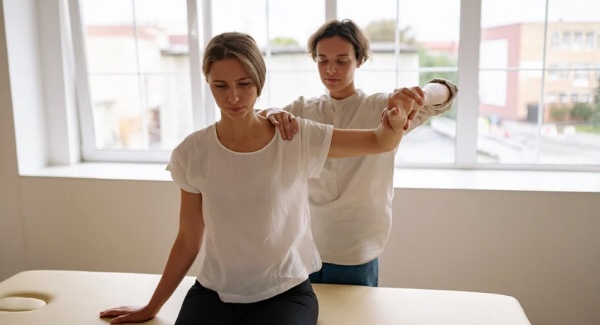NHS and Massage Therapy: Integrating Holistic Care

Imagine a healthcare system that addresses your physical ailments and considers your overall well-being through holistic practices like massage therapy. This vision is becoming a reality in the UK as the NHS increasingly recognises the value of integrating holistic care methods into conventional treatment plans.
- How is massage therapy being integrated into NHS and British healthcare?
- Massage therapy is increasingly integrated into NHS and British healthcare as a complementary treatment, helping manage pain, reduce stress, and improve patient well-being alongside conventional medical care.
Massage Therapy in NHS and British Healthcare
The National Health Service (NHS) is evolving to incorporate more holistic approaches to patient care, reflecting a growing understanding of the interconnectedness of physical, mental, and emotional health. One such approach gaining traction is massage therapy, renowned for its therapeutic benefits and ability to complement traditional medical treatments.
Massage therapy is increasingly recognised within the NHS for its potential to enhance patient outcomes and support comprehensive health management. By integrating massage therapy into healthcare settings, the NHS can offer a more diversified treatment approach, catering to patients' diverse needs. This integration aligns with the NHS's broader mission to provide patient-centred care, focusing on the whole person rather than specific symptoms or illnesses.
The use of massage therapy in NHS facilities can range from palliative care units to physiotherapy departments, aiding in pain management, rehabilitation, and stress reduction. For instance, patients undergoing cancer treatment often experience significant physical discomfort and emotional stress. Massage therapy can help alleviate pain, reduce anxiety, and improve overall well-being, making the challenging journey of cancer treatment more bearable.
In addition to cancer care, massage therapy is also beneficial for patients with chronic conditions such as arthritis, fibromyalgia, and cardiovascular diseases. Massage therapy can help manage symptoms and improve the quality of life for these patients by reducing muscle tension, improving circulation, and enhancing mobility. Furthermore, the relaxing effects of massage therapy can contribute to better mental health, aiding in the management of depression, anxiety, and stress-related disorders.
One notable example of massage therapy in the NHS is its use in maternity care. Pregnant women can benefit from massage therapy to alleviate common discomforts such as back pain, swelling, and fatigue. Postpartum massage can also aid in recovery, helping new mothers cope with the physical and emotional demands of childbirth and early motherhood.
The integration of massage therapy into NHS services also highlights the importance of preventive care. Regular massage therapy can help prevent the onset of stress-related illnesses and chronic conditions by promoting relaxation, reducing stress, and enhancing overall well-being. This preventive approach not only improves individual health outcomes but also reduces the long-term burden on the healthcare system.
Training and education are critical to successfully integrating massage therapy into the NHS. Ensuring that healthcare professionals know the benefits and applications of massage therapy can facilitate its acceptance and implementation. Collaboration between massage therapists and medical practitioners can lead to more coordinated and effective patient care, leveraging the strengths of both conventional and complementary therapies.
Overall, including massage therapy within the NHS and British healthcare system represents a forward-thinking approach to patient care. By embracing holistic and integrative methods, the NHS can offer more comprehensive and effective treatments, ultimately improving the health and well-being of patients across the UK.

The Role of Massage Therapy in the NHS
Massage therapy has been acknowledged for its potential to enhance the overall effectiveness of conventional medical treatments. The NHS aims to provide a more comprehensive approach to health and wellness by integrating massage into patient care plans. This integration is particularly significant in areas such as pain management, mental health, and rehabilitation.
Benefits of Integrating Massage Therapy
Incorporating massage therapy into the NHS can offer numerous benefits, transforming patient care and improving overall health outcomes. These benefits include:
- Pain Management: Massage therapy can significantly reduce chronic pain, offering relief to patients suffering from conditions like arthritis, fibromyalgia, and lower back pain. By targeting specific areas of discomfort, massage can help decrease reliance on pain medications and improve daily functioning.
- Mental Health Support: Regular massage sessions can alleviate symptoms of anxiety, depression, and stress, promoting overall mental well-being. Massage therapy's relaxing nature helps lower cortisol levels and increase the production of serotonin and dopamine, contributing to improved mood and emotional health.
- Improved Circulation: Massage enhances blood flow, which is crucial for delivering oxygen and nutrients to tissues and organs. Improved circulation can aid in the healing process, reduce muscle soreness, and improve overall cardiovascular health, supporting recovery from injuries and surgeries.
- Enhanced Mobility: For patients recovering from surgery or injury, massage therapy can improve flexibility and reduce stiffness. Massage helps patients regain mobility and function more effectively in their daily lives by increasing the range of motion in joints and alleviating muscle tightness.
- Holistic Care: By addressing both physical and emotional needs, massage therapy supports a more holistic approach to patient care. This comprehensive treatment method considers the whole person, not just the symptoms, leading to better patient satisfaction and outcomes. Holistic care is especially beneficial for patients with chronic illnesses, as it can improve their overall quality of life.
- Enhanced Immune Function: Regular massage therapy can boost the immune system by stimulating lymphatic flow, which helps to remove toxins and improve the body's natural defence mechanisms. This can lead to a decreased frequency of illnesses and a faster recovery from infections.
- Stress Reduction: Massage therapy promotes relaxation and reduces stress levels, which can have a profound impact on overall health. Lower stress levels are associated with reduced risk of chronic diseases, improved sleep quality, and better mental clarity.
- Complementary to Conventional Treatments: Massage therapy can complement conventional medical treatments, enhancing their effectiveness and providing a more comprehensive approach to health care. It can be used alongside physiotherapy, medication, and other treatments to create a well-rounded care plan.

Current Initiatives and Future Prospects
Several NHS trusts have already begun integrating massage therapy into their patient care programs. For example, oncology departments in certain hospitals offer massage therapy to help manage the side effects of cancer treatments and improve patients' quality of life. Additionally, mental health units are exploring the benefits of massage therapy for reducing stress and enhancing emotional well-being.
Challenges and Considerations
Despite its numerous benefits, integrating massage therapy into the NHS presents several challenges that must be addressed to ensure successful implementation. One of the primary challenges is resource allocation. It ensures sufficient funding and resources to support massage therapy programs within the NHS framework. This includes the financial investment and the physical space and equipment necessary for providing massage therapy services. With the NHS already facing budget constraints and high service demand, finding the resources to support new programs can take time and effort.
Another significant challenge is training and certification. Guaranteeing that massage therapists are adequately trained and certified to work within a medical setting is essential to ensure the safety and efficacy of the treatments provided. This means establishing rigorous training programs and certification processes that meet medical standards. Additionally, ongoing education and professional development are necessary to keep practitioners updated with the latest techniques and research in massage therapy.
Awareness and acceptance of massage therapy among healthcare providers and patients also pose a challenge. Promoting awareness of the benefits of massage therapy and gaining acceptance within the medical community can be difficult, especially given the traditional focus on pharmaceutical and surgical interventions. Healthcare providers need to be educated about the potential benefits of incorporating massage therapy into treatment plans, and patients need to be informed about how massage therapy can complement their existing medical care.
Furthermore, integrating massage therapy into the NHS requires a cultural shift towards a more holistic approach to healthcare. This involves recognising the value of complementary therapies in promoting overall health and well-being and understanding that physical, mental, and emotional health are interconnected. Overcoming scepticism and resistance from healthcare providers and patients will require a concerted effort to demonstrate the effectiveness of massage therapy through research and positive patient outcomes.
Despite these challenges, the potential benefits of incorporating massage therapy into the NHS are significant. The NHS can successfully integrate massage therapy into its healthcare services by addressing resource allocation, ensuring proper training and certification, and promoting awareness and acceptance. This holistic approach to patient care can lead to improved health outcomes and a better quality of life for patients across the UK.
How to Access Massage Therapy Through the NHS
Patients interested in exploring massage therapy through the NHS should consult their GP or healthcare provider. In some cases, referrals to massage therapists or holistic care programs may be available, particularly for patients dealing with chronic pain, mental health issues, or rehabilitation needs.
Summary - Future of Holistic Care
The future of the NHS will likely see a continued expansion of holistic care practices, including massage therapy. As more research supports the benefits of integrative approaches, the NHS will increasingly adopt these methods to enhance patient care. This progressive shift towards holistic health signifies a promising development in the British healthcare system, aiming to treat the whole person rather than just the symptoms.
In conclusion, integrating massage therapy into the NHS represents a significant step towards a more comprehensive, patient-centred approach to healthcare. By embracing holistic practices, the NHS is not only improving the effectiveness of conventional treatments but also promoting overall well-being and quality of life for patients across the UK.
Reference: Massage therapy, aromatherapy and reflexology
Author – Martha Anderson - a creative writer, blogger, and expert in massage therapy, holistic wellness, nutrition, and personal training. She has a passion for helping individuals achieve optimal health and well-being. Martha holds advanced sports science and nutrition degrees and is committed to evidence-based practices. Her work emphasises understanding the intricate connections between physical health and mental wellness.
Search Massage Therapists Near You.
More From Our Blog
Latest Blogs
UK Massage Industry Booming in 2026: 11% of UK Adults Now Use Massage Therapy (UK Report 2025)
Post-Thai Massage Care: Tips for Maximizing the Benefits After Your Session
Thai Massage for Beginners: Answering Common Questions for Your First Session
Choosing the Right Thai Massage Therapist: What to Look for in a Qualified Professional
Post-Thai Massage Care: Tips for Maximising the Benefits After Your Session
Preparing for Your Thai Massage: Tips on What to Wear and How to Get Ready
How to Talk to Your Therapist for the Best Thai Massage Experience
What to Expect During a Traditional Thai Massage Session
A Guide to How Thai Massage Techniques Can Correct Postural Issues
How Thai Massage Can Help with Back Pain, Headaches, and Sciatica
View All Blogs
Advertise with Massages Me and Grow Your Business!
We are the leading massage platform for massage therapists in London and across the UK covering all of England, Scotland, Wales and Northern Ireland. Our aim is to promote individual therapists and venues in the UK, and help professional and casual body workers providing therapeutic and relaxing massages to expand their businesses and build desirable client base.
We provide a friendly and reliable online advertising platform for qualified Masseuses, students, and salons to connect with potential clients looking for relaxing and therapeutic massages - onsite and offsite mobile services across the UK.
Are you looking to meet more customers? Get your profile listed and start getting bookings today!



